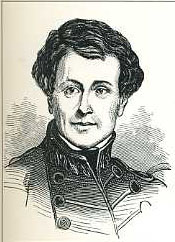Alexander Slidell Mackenzie | |
|---|---|
 | |
| Birth name | Alexander Slidell |
| Born | April 6, 1803 New York City, New York |
| Died | September 13, 1848 (aged 45) Scarborough, New York |
| Allegiance | United States of America |
| Service | United States Navy |
| Years of service | 1815–1848 |
| Rank | Commander |
| Commands | USS Somers |
| Relations | John Slidell (brother) Matthew C. Perry (brother-in-law) Ranald Slidell Mackenzie (son) Alexander Slidell MacKenzie (son) |
| Other work | Author, naval historian |
Alexander Slidell Mackenzie (April 6, 1803 – September 13, 1848), born Alexander Slidell, was a United States Navy officer, famous for his 1842 decision to execute three suspected mutineers aboard a ship under his command USS Somers in the Somers Mutiny. Mackenzie was also an accomplished man of letters, producing several volumes of travel writing and biographies of early important US naval figures, some of whom he knew personally.
Mackenzie was the brother of Senator John Slidell of Louisiana, who was later involved in the American Civil War's Trent Affair.
Mackenzie was the captain of USS Somers when it became the only US Navy ship to undergo a mutiny, which led to executions, including Philip Spencer, the 19-year-old son of the Secretary of War John C. Spencer.
Mackenzie's handling of the Somers Mutiny, including its lack of a lawful court martial, was highly controversial and public opinion ran against him. The mutiny proved the need for systematic training of cadets before they went to sea. In 1845, Secretary of the Navy George Bancroft seized on the Somers affair as a reason to establish the United States Naval Academy.[1]
- ^ Lehman, John (August 8, 2010). "Review of William Leeman's Naval Academy history, The Long Road to Annapolis". The Washington Post. p. B6. Retrieved 2010-08-08.